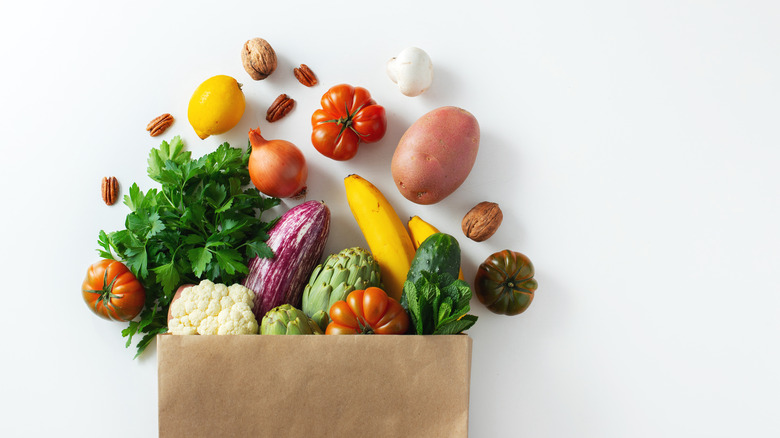What Foods Are Yin Vs. Yang?
If you're familiar with Traditional Chinese Medicine (TCM), you'll know of its reliance on hot versus cold. When it comes to what you ingest and how the energy flows in your body, yin and yang foods are seriously important to this discipline. Yin and yang foods — also known as warming and cooling foods — are said to impact various organs and the way your body reaches its optimal state.
According to the HuffPost, one of the primary aims of TCM is to achieve balance within the body, and balancing hot and cold is one of the most important aspects of this pursuit. To properly maintain this equilibrium, your diet should have an equal amount of both yin and yang foods. "[Chinese medicine] recognizes that all foods have a particular energy — some more yin, some more yang," Felicia Yu, a physician and assistant clinical professor of health sciences, told the outlet. "Yin foods are typically thought of as cooling and moistening, while yang foods help to warm, dry, and heat."
However, don't confuse warm with spicy. The terms "yin" and "yang" refer to the energy of the food itself. When you're eating too many warming foods or live in a hot climate, you may experience constipation or an overall sense of dryness, the outlet reports. Essentially, the heat can build up in your body without proper release. On the other hand, too many "yin" foods can lead to brain fog and fatigue.
Traditional Chinese Medicine uses yin and yang foods as healing tools
In Traditional Chinese Medicine, food can be a healing tool that's based on your unique makeup. Some people naturally run hot or cold; practitioners often use a combination of food, herbs, and acupuncture to rectify any imbalance. "Food, cooling or warming, may be consumed based on constitutional type to help correct some of the abnormality in constitution and prevent illness. In this case, food is used for therapeutic purposes," Jinhua Xie, a certified acupuncturist and Chinese herbalist and professor of oriental medicine, told the HuffPost.
As for which is which, yang foods produce heat. Beef, cinnamon, caffeine, eggs, garlic, ginger, onions, peanuts, and sweet potato are all considered warming, Mindbodygreen reports. If you're more sensitive to the cold and tend to be fairer in complexion, adding yang foods to your diet can help you feel more centered and balanced.
Yin foods help to cool the system and work well with those who naturally struggle with heat. Apples, bananas, broccoli, cucumber, celery, kale, mushrooms, spinach, and watermelon all represent cooling foods that can temper internal heat, according to ot the outlet. Think of it this way, when you're freezing, you're more likely to relish in the idea of having squash soup than reach for a cold cucumber.
Finding internal balance may come down to which foods you're consuming. Determine your natural constitution to find the best yin or yang foods for you.

